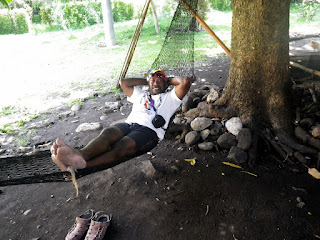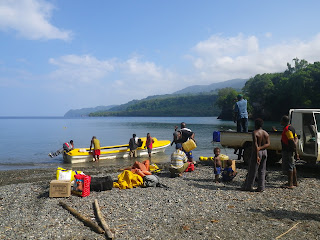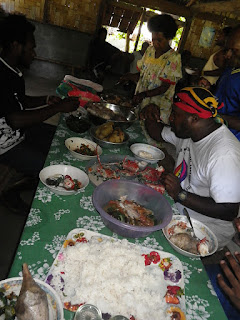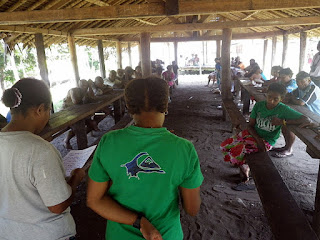It was to be a 5am start and though we were all ready, the truck did not arrive till 05.55 as it had not been filled up with diesel and the pump did not open till 6am. There was also some story about a wake and some kava drinking well into the night.
After a 2 hour road trip , fording several rivers where bridges had previously been washed away we reached Tasiriki at the south end of the West coast. Here we transshipped into a fibreglass boat and eventually at 9am started the 7 hour journey up the coast to Nokuku, about 60 miles away.
The communities are very isolated, no roads, no electricity, no mobile phone connection, irregular boats.
The sea was calm with a bit of a swell and we laid out lines for fish (caught a tuna and another smaller mackerel like fish) and delivered letters to various communities. This was done by backing up to the breaking surf and a young man leaping off with letter held high and jumping through the rolling waves to hand it to some passing youth or pikinini l for further transmission. Meanwhile we admired the high peaks of the coastal range reaching up to 5000 feet and shrouded in cloud.
 |
| Nokuku clinic |
 |
| Doing a tutorial on shoulder pain |
 |
| Jeffrey taking a well deserved rest |
 |
| My sleep mat and Julius's mat |
 |
| Early morning and the banyan tree |
 |
| Jean Marie grating coconut |
Nokuku is a well organised community tucked under the mountains. We were given a great welcome and spent 3 nights there. The first day we had 12 custom healers or 'clevas' and we talked about their practice and we gave them as much information about HIV and STI as we could. Naturally they think they have appropriate treatment for jaundice, flu and syphilis sores since when you give the treatment the problem goes away as is the natural history of the disease, as doctors did in the 19th century with cupping and injections of mercury or whatever. The clinics are set every 20 miles so it is no wonder people seek out the help of their 'clevas' round the corner.
 |
| Julius lecturing |
 |
| The 'clevas' |
 |
| Julius under the banyan tree |
They were a reflective group with lots of experience of illness. In a different world a lot of these 'clevas' would become nurses or aid post workers. I spent some time talking about back ache, referred pain, sciatica and sore knees which they were very interested in. I think it may have improved their diagnostic skills.
Next day we had community education which was very well received with many questions.
Eventually on the last day we had a great feast and a splendid send off with sulu sulu round the neck and presents.
Next stop was Wunpuko another 25 miles on just beneath the northern tip of Santo. Crowds of school children helped us pull the boat high up on the shingle.
After settling into the guest house we went for an evening swim in the river which was delightfully refreshing. The men always 'swim' upriver of the women to avoid 'downhill pollution'.
Next day we had another full day on community education with some good audience participation like questions 'Why do men always want sex?' It was only after we had left that one of our group talked about the possible sex workers there (whether that was from personal experience I never found out).
I visited the clinic which is staffed by Nettie. Thirty years ago she had been a second year nursing student and her new husband took her away from nursing school. She practised as a traditional midwife and now in her fifties she went back to train as a nurse aid. Her clinic was spotless (alas forget to get her photo!)

Now after an early 6 am start we had a further 5 hours trip back half way down the coast to Tasmate (with a short break at Nokuku to pick up a brother, a cousin and mangoes and taro).
 |
| Beautiful banyan tree of Tasmate |
 |
| Shower under the banyan tree |
 |
| Nurse Meriame is new and has spring cleaned her clinic |
 |
| Why bother to go to yet another 'workshop' |
Last night in the nurse's house in a very comfortable bed with a running water shower and flush toilet. A half day community education next morning completed the tasks so we left that afternoon for Tasiriki arriving 4 hours later to be met by the Provincial health manager who packed us into the truck getting us back to Luganville by 7pm.
All in all a good trip, much achieved, I managed to spend a half day at each clinic doing supervision and learnt a lot from Jeffrey. Julius was very brave since he is a country Kenyan from near Kisumu and had not been to sea much. I spent quite a lot of the journey talking him through different wave forms and when to remain calm and when to react to a boat about to capsize. (We came close to be caught broadside in a breaking wave on to the shore but were saved by Jean Marie who leapt into the sea and by brute force turned the boat head into the waves). 200 litres of petrol together with touring allowances for 3 staff meant the trip probably cost about £1000. It is very expensive to access and provide health care to these isolated communities.























No comments:
Post a Comment